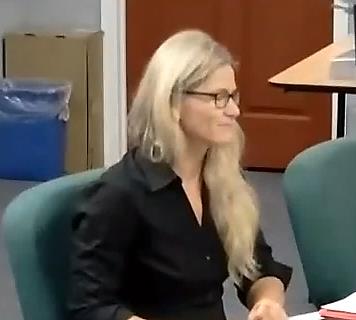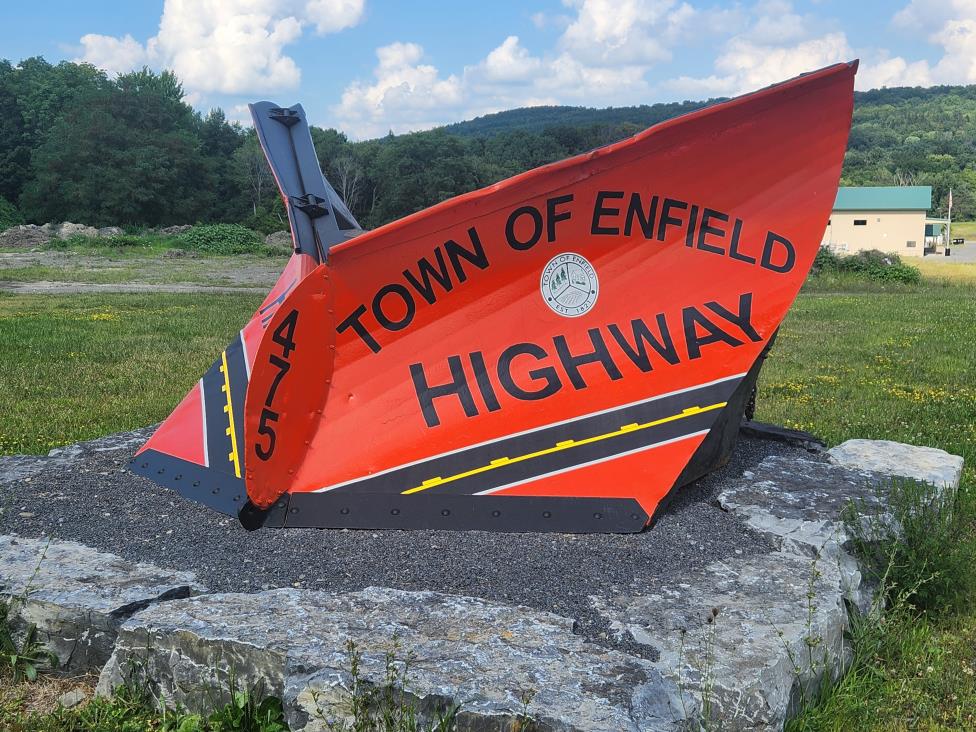Tax levy rides meeting roller-coaster; Rollins gets (very) part-time clerk
by Robert Lynch; September 18, 2025
For a second straight year, the Enfield Town Board stands poised to dig deep into its bank account to prevent next year’s tax levy from soaring into the stratosphere with a double-digit increase.

At the end of a three-and-a-half hour meeting, one marked by compromise at some points and sharp elbows at others, the Town Board September 17 refined Town Supervisor Stephanie Redmond’s 2026 Tentative Budget and ended the night with a spending document that would raise next year’s property tax levy by 6.5 percent, close to the 6.12 percent adopted for the 2025 budget last year.
Near the end of those discussions Wednesday, the Town Board voted to provide Highway Superintendent Barry Rollins his first-ever administrative assistant/clerk. Rollins had requested the assistant be hired for up to 20 hours per week at a cost of $26,000. The budget compromise provided about half those hours and that amount.
Redmond’s initially-submitted Tentative Budget, presented the Town Board September 10, had omitted Rollins clerical request altogether as Redmond had sought to trim spending and keep taxes in check.
But Rollins pressed for the position’s inclusion at this Wednesday’s most recent budget session. Aided by advice from Town Clerk Mary Cornell, the Board pulled enough money from a couple of different accounts, sought middle ground, and provided Rollins an office assistant for eight-to-ten hours weekly.
As another key issue addressed at the meeting, the Board considered, yet tossed aside an initiative that would have migrated all Highway Department employees—including Highway Superintendent Rollins—to a less expensive health insurance benefits plan. Nevertheless, the board endorsed an amended motion that could eventually transition coverage to that cost-saving plan in future years and do it in a way that spares employees from paying higher co-pays for health care.

“I’m not willing to cut this budget on the backs of our employees,” Supervisor Redmond said bluntly in rejecting the immediate health insurance conversion.
As first presented the Town Board September 10, the Enfield Supervisor’s $2.6 Million Tentative Budget would have raised the Town tax levy by 7.32 percent. But as the Board and Town Bookkeeper Blixy Taetzsch spent hours Wednesday methodically wandering through the many budget lines, they encountered errors or omissions that once corrected ballooned the levy increase to 10.2 percent.
“We can’t do ten percent; that’s double-digits,” Redmond reacted.
Only by tapping accumulated and anticipated fund balances—the Town’s bank savings—and digging into it deeper than first expected, did the Board lower the levy hike to 6.5 percent when it reached a stopping point just after 10 PM and adjourned for the night.
Enfield’s budget work remains far from finished. Members will reconvene October 8. During their Regular Monthly Meeting, they’ll take up the budget again.
An earlier-established timetable has allowed for yet a further budget work session, one on October 15. But as Wednesday’s meeting concluded, Redmond signaled she’d hope the October 8 meeting could resolve all remaining issues. That would allow the plan’s elevation to a Preliminary Budget that night and lead to a Public Hearing on the budget later that month.
Taxpayers care most about tax burdens, understandably. But to dig into the depths of Wednesday’s deliberations, one discovers how the levy stayed in check. It came through use of fund balances.
One year ago, the Town Board assigned $125,000 of its accumulated fund balance to offset day-to-day expenses. Revised estimates bookkeeper Taetzsch presented the Town Board this Wednesday indicated that much of that savings would, indeed, be spent by year’s end. That said, the Town would also likely close its books this year with about $56,000 in net revenue over expenses.

Whereas the 2025 Budget tapped $125,000 from the fund balance, and whereas Redmond’s initially-tendered 2026 budget would have drawn it down by $100,000—$25,000 less than in 2025— the revisions discussed this latest Wednesday, although not yet final, would remove $182,500 from fund balance in 2026; $175,000 of it to contain the tax levy. An additional $7,500 would support Rollins’ part-fund administrative assistant.
Clerical help at the Highway Department was an issue settled through compromise. But before it was, the matter separated Supervisor Redmond and Highway Superintendent Rollins for a time Wednesday.
“But we’re trying to find places to make cuts, not trying to find ways to add into the budget,” Redmond observed as the Superintendent pressed for his administrative help. “It’s not that I don’t think you need it, it’s not that I don’t think you deserve it, it’s that I don’t know where it’s coming from,” she told Rollins.
“Tax dollars,” the Highway Superintendent answered. “It is what it is, if you run a business. This is a business.”
Eventually, after this Councilperson, Robert Lynch, suggested splitting the difference and others agreed, the Town Board scaled back the clerical position to roughly half of what Rollins had first requested and funded it mostly through fund balance, but also in part through tapping another spending line in Rollins’ budget.
A survey of seven nearby rural towns, shared at the meeting, showed that four of those towns already provide their highway superintendent’s part- or full-time clerical help; a fifth town provides it minimally.
Rollins also complained about the Supervisor’s budget deleting a $75,000 equipment reserve allocation, an amount that would have been equal to that assigned for the current year.
“Se we took away my equipment reserve?” Rollins asked.
“I didn’t know where else to cut,” Redmond apologetically advised the Superintendent.
“The Highway Department is 80 percent of this town,” Rollins stated. “Everybody benefits from all the roads. It’s our obligation to make ‘em safe and legal and take care of ‘em,” he continued. “Everybody seems to be pretty pleased with the conditions of the roads. So if you’re going to start cuttin,’ your services are going to go backwards. That’s all there is to it. It’s plain and simple.”
Bookkeeper Taetzsch predicted that year-end savings achieved through unspent highway moneys could replenish the equipment reserve account somewhat.

The sharpest exchanges Wednesday occurred between Supervisor Redmond and this writer, Councilperson Lynch, as they revisited a prior dust-up they’d had during this past July and August. It involved Enfield’s failure to purchase a used mower-tractor for a fraction of what it would cost new. The proposed budget and Enfield’s Capital Plan allow for a new tractor, a predicted $165,000 expense. And the investment inflates the Highway Department’s equipment line by $135,000, a full 96 percent.
“And times are hard. We may not be able to implement the Capital Plan,” this Councilperson counseled Board colleagues. As an alternative, he advised the Highway Superintendent to “look and shop” for another good, used tractor and bring his request before the Town Board next year.
Lynch’s comment prompted Redmond to suggest, arguably erroneously, that this Councilperson “blew it” for Enfield and nixed the prior purchase opportunity by his inquiring about the machine independently as the tractor was being readied for auction. The Supervisor alleged that the intervention had “cost the taxpayers $100,000 in the next, coming year,” an insinuation that this Councilperson firmly denied.
“I don’t want it to be on the public record being said that I blew something that I did not blow, please,” this Councilperson corrected.
“Well, that’s what I hear,” Redmond reacted, partly speaking under her breath.
The budget meeting went on.
What partly drove the Tentative Budget’s tax levy upward was the Supervisor’s initial underestimate of how much health insurance premiums would rise for the six Highway Department employees (including Superintendent Rollins) covered by Enfield’s provider, the Greater Tompkins County Municipal Health Insurance Consortium (GTCMHIC). Supervisor Redmond said September 10th that she’d figured an 11 per cent increase. Bookkeeper Taetzsch said Wednesday she’d estimated 15 percent. But the true expected increase, likely to be finalized by the GTCMHIC Board September 25, is 18 percent.
It’s an “expensive dinosaur,” the Councilperson, the Town Board’s GTCMHIC representative, said of the Town’s current “Legacy” PPO health insurance plan, quoting a Consortium official. “And I wouldn’t be so sure if a year from now the Legacy PPO plan even exists.”

The current Enfield health package provides more generous benefits and lower copays than do GTCMHIC‘s other plans, but its premiums cost Enfield more. As recently as last March, the Consortium’s Executive Directed addressed the Town Board and urged it transition to a lower-cost “Platinum Plan” alternative.
This Councilperson, Lynch, moved Wednesday to mandate that all policies migrate to the Consortium’s Platinum Plan next year. Based on Consortium comparisons, he predicted Enfield own would save $37,704 in 2026 through the migration. Superintendent Rollins pushed back.
“There’s a big difference in copays,” Rollins asserted. “It is not acceptable because the copays are ridiculous. Just the Emergency Room itself goes from like $30 to $250.” (Rollins numbers were off, but only slightly, for 2026.)
Led by the Supervisor, the Town Board rejected any mass health plan migration for next year. Instead, it authorized investigation into establishing a “health reimbursement account” to bridge the copay gap for eligible employees and thereby permit potential universal migration to the Platinum Plan in 2027.
****
One thing more. Highway Superintendent Rollins gave first word September 17 of what may show up this time next year; namely his request for a sixth, full-time subordinate, a designated mechanic.
The Highway Superintendent claimed his department has already spent $40,000 in outside labor to work on his department’s equipment. Repair shops charge $180 per hour and earn a markup on parts. An in-house mechanic, Rollins maintained, could cost only $30-35 per hour and perform 80 percent of the work that he presently must farm out.
“An administrative assistant this year, but a mechanic is coming,” Rollins cautioned the Town Board.
###

